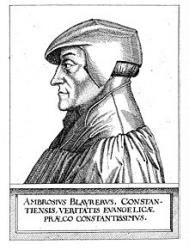Planning worship?
Check out our sister site, ZeteoSearch.org,
for 20+ additional resources related to your search.
- |
User Links
Person Results
Sebald Heyden
1499 - 1561 Author of "O Mensch, bewein dein Sünde groß" in Antwort Finden in alten und neuen Liedern, in Worten zum Nachdenken und Beten
Sebald Heyden
Pantycelyn
Author of "Nis gall angylion nef y nef" in Old and New Welsh and English Hymns See Williams, William, 1717-1791
Pantycelyn
Matthias Jorissen
1739 - 1823 Author of "Erhebet er sich, unser Gott" in Antwort Finden in alten und neuen Liedern, in Worten zum Nachdenken und Beten
Matthias Jorissen
Valentin Ernst Löscher
1673 - 1749 Author of "Ich grüße dich am Kreuzessatmm" in Antwort Finden in alten und neuen Liedern, in Worten zum Nachdenken und Beten
Valentin Ernst Löscher
Ambrosius Blaurer

1492 - 1564 Person Name: Ambrosius Blarer Author of "Jauchz, Erd, und Himmel, juble hell" in Antwort Finden in alten und neuen Liedern, in Worten zum Nachdenken und Beten Blaurer, Ambrosius, son of Augustine Blaurer, Councillor of Constanz, was born at Constanz, April 4, 1492. In 1513 he graduated at Tubingen and entered the convent of Alpirsbach, in the Black Forest, where he was chosen Prior. After studying Holy Scripture and the writings of Luther, he became dissatisfied with his position and left the convent in 1522, and went to Constanz. In 1523 he openly espoused the cause of the Reformation, and began to preach in 1525. In 1529 he commenced his work as Reformer of Swabia, in which, after the restoration of Duke Ulrich, 1534, he received his help and countenance till 1538, when the growing opposition of the Lutheran party led him to withdraw from Württemberg. He returned to Constanz, where he remained till 1548, when by the operation of the Interim [Agricola] and the seizure of the town by the Emperor, he was forced to flee to Griessenberg, in Thurgau, and in the end of 1549, to Winterthur. He became pastor at Biel, in the Jura, 1551, but returned to Winterthur, 1559, and died there, Dec. 6, 1564 (Koch, ii. 62-76; Allgemeine Deutsche Biographie, ii. 691-693). Koch characterises him as the most important of the hymn-writers of the Reformed Church at the time of the Reformation. Some thirty in all of his hymns are preserved in manuscript at Zurich and Winterthur. The only one translation into English is:—
Wie's Gott gefällt, so gfällts mirs auch. [Trust in God.] Wackernagel, iii. p. 588, quotes it in 8 stanzas of 10 lines from a manuscript of 1562 at Zilrich, "Etlich geistliche gsang und lieder vor jahren geschriben durch meister Ambrosium Blaurern," and thinks it was probably written about 1526. In his Bibliographie, 1855, p. 220, he had cited a broadsheet, c. 1548, where it appears as one of "Zwey schöne Newe Lieder doss frommen Johansen Friderichon von Sachson, welche Er in seiner Gefangkmiss gtdichtet hat" [i.e. 1547-52, after the battle of Mühlberg, 1547]; but this ascription Wackernagel thinks is as little justified by the personality as by the circumstances of the Elector. Though the authorship of the hymn be somewhat doubtful, its value is undeniable, and since its reception into the Bergkreyen, Nürnberg, 1551, it has appeared in most subsequent collections, and is No. 720 in the Unverfälschter Liedersegen 1851. The translations are:—(1) "God's will is mine: I dare not stray," by Dr. G. Walker, 1860, p. 91. (2) "What pleaseth God, that pleaseth me," by Miss Winkworth, 1869, p. 124.
-- John Julian, Dictionary of Hymnology (1907)
Ambrosius Blaurer
Edward A. Collier

1835 - 1920 Person Name: Rev. Edward A. Collier Author of "O God, Arise! and by Thy Might" in The New Christian Hymnal Collier, Edward Augustus, a Congregational Minister at Kinderhook, New York State, is the author of "Thou, Lord, art God alone" (Holy Trinity) in the Scotch Church Hymnary, 1898.
--John Julian, Dictionary of Hymnology, New Supplement (1907)
========================
Collier, Edward. (New York City, November 21, 1835--December 20, 1920). Congregationalist. Son of Ezra and Mary Shaw Collier. New York University, A.B. 1857; A.M. 1860; D.D. 1884. Attended Princeton Theological Seminary, 1860. Pastorates at Saugerties, NY. 1860-1861; Armenia, New York, 1861-1864; Kinderhook, New York, 1864-1907, then pastor emeritus. Author Lyrics from the Psalter, 1907; A History of Old Kinderhook, 1914; also many metrical versions of the psalms, etc.
--Howard Springer, DNAH Archives
Edward A. Collier
Fred R. Anderson
b. 1941 Author of "Sing Praise Unto the Name of God" in The Presbyterian Hymnal FRED R. ANDERSON is pastor emeritus of Madison Avenue Presbyterian Church in New York City, a liturgical theologian, and a recognized hymn writer whose hymn and psalm texts appear in Protestant and Catholic hymnals around the world. —Singing God's Psalms (Grand Rapids: Eerdmans, 2016)
His collections of psalm paraphrases include Singing Psalms of Joy and Praise (1986) and Singing God's Psalms (2016).
Fred R. Anderson
Johann Michael Altenburg
1584 - 1640 Person Name: Johann Michael Attenburg, 1584-1640 Author of "Fear not, thou faithful Christian flock" in The Chapel Hymnal See Altenburg, Michael, 1584-1640
Johann Michael Altenburg
Martin Tel
Author (refrain) of "Lift Up Your Voices (Psalm 68:1-19)" in Lift Up Your Hearts Martin Tel is the C. F. Seabrook Director of Music at Princeton Theological Seminary in Princeton, New Jersey. He conducts the seminary choirs, teaches courses in church music, and administers the music for the daily seminary worship services. He served as senior editor of Psalms for All Seasons: A Complete Psalter for Worship (2012). His love for music began in a dairy barn in rural Washington State, where he heard his father belt out psalms and hymns while milking the cows. Martin earned degrees in church music and theology from Dordt College, the University of Notre Dame, Calvin Theological Seminary, and the University of Kansas. He has served as minister of music in Christian Reformed, Reformed Church in America, and Presbyterian congregations. With his wife, Sharilyn, he is raising three children in Princeton, New Jersey.
Lift Up Your Hearts
Martin Tel


 My Starred Hymns
My Starred Hymns


